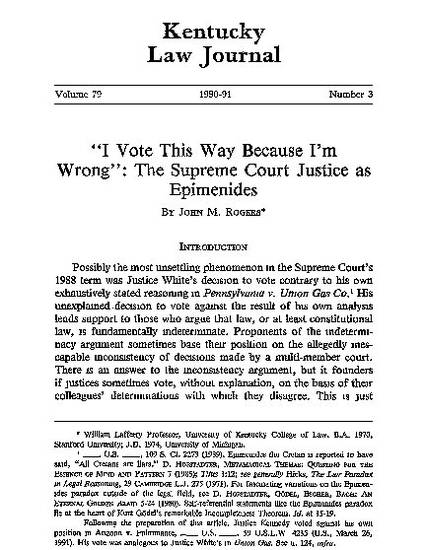
Possibly the most unsettling phenomenon in the Supreme Court's 1988 term was Justice White's decision to vote contrary to his own exhaustively stated reasoning in Pennsylvania v. Union Gas Co. His unexplained decision to vote against the result of his own analysis lends support to those who argue that law, or at least constitutional law, is fundamentally indeterminate. Proponents of the indeterminacy argument sometimes base their position on the allegedly inescapable inconsistency of decisions made by a multi-member court. There is an answer to the inconsistency argument, but it founders if justices sometimes vote, without explanation, on the basis of their colleagues' determinations with which they disagree. This is just what Justice White did when he cast the deciding vote to affirm the lower court's decision in Pennsylvania v. Union Gas Co.
What reasons might there be for such different approaches to a justice's ruling on the basis that he or she is wrong? Is there law on the subject, or is the determination committed to the discretion of the individual justice? Should it be? If there is law, why is it not articulated? To answer these questions, the logical first step is to see how Supreme Court justices have answered them in the past.
Part I of this Article begins to answer the previously stated questions by reference to some 150 Supreme Court cases that might have resulted in a justice's decision to vote against his own analysis. In these cases no justice took the occasion presented to decide a case contrary to his own logic. Part II completes the discussion of precedent by exploring six additional cases in which justices did apparently vote against their own determination of the law in the cases before them. For several reasons, none of these cases provides an adequate basis for the decision made by Justice White in Union Gas. Part III discusses several possible policy goals that might have driven Justice White to vote as he did. This Article concludes that a Supreme Court justice should not vote contrary to his own stated analysis, because such action is harmful and destabilizing to the determinacy of the law.

Kentucky Law Journal, Vol. 79, No. 3 (1990-1991), pp. 439-475